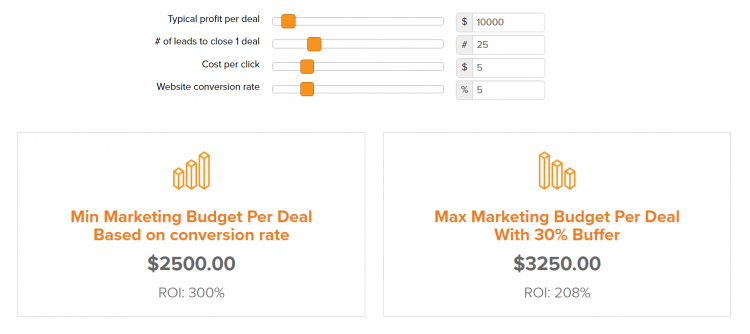 When you click that big red launch button…
When you click that big red launch button…
Something’s gonna happen.
Either the campaigns that you created will give you a healthy ROI — the phone will ring, leads will flow, and deals will close. OR… crickets.
And if you’ve ever tried your luck at PPC ads for your real estate investing business before, then you’ve probably experienced just as many crickets as conversions (or maybe a few more of the crickets…).
That isn’t because PPC advertising doesn’t work for the real estate industry. For many of our members at Carrot, paid ads drive business revenue BIG time. If you do it right, then paid advertising can become a real driving force for your business — a tool you can depend upon to create quick lead generation and revenue flow.
But getting it right, of course, is sort of the issue.
Truth is, the success of your PPC campaign for finding motivated searchers (buyers or sellers) depends largely upon one thing: how you prepare before you launch.
Here are 5 pre-launch steps to give your real estate PPC campaigns the best possible chance of success
Step #1: Do Market-Specific Keyword Research
Perhaps the biggest mistake that new PPC advertisers make is launching a campaign without first doing market research.
It’s remarkably easy to assume that you know your market already. After all, you’ve probably talked with your market, done at least a few deals, and maybe even lived in your area of operation for quite some time.
Regardless, don’t skip this step. ;)
Spending a little extra time to ensure you’re targeting the right people with your PPC campaign and writing copy that resonates with their problems, pains, fears, and desires is the single most powerful thing you can do to increase your ROI and website conversion rate once launched.
In regards to PPC, keyword research is the equivalent of market research.
You can use Google AdWords Keyword Planner and/or Ubersuggest to perform your research.
Here’s what you want to pay attention to…
- Competition — How many other people are competing for this keyword phrase? The more people you’re competing with, the higher your cost-per-click will soar. This isn’t necessarily a bad thing. So long as the keyword phrase is high value and you can afford the cost-per-click while maintaining a healthy ROI, then high competition might be an indicator of a valuable keyword phrase. If you have a smaller budget, though, then you might consider targeting something less competitive.
- Suggested Bid — In Google AdWords Keyword Planner, this is the number that Google suggests you bid in order to get consistent clicks and impressions. When you see this number, keep your budget in mind and ensure that the two numbers line up for a healthy ROI.
- Search Volume — This is the monthly number of people who search for a given keyword phrase every month. More search volume means more people to get your ad in front of. Low search volume means the opposite.
- Intent — This is perhaps the most important part of your keyword research. What is the intent behind the keyword that you’re considering targeting with your PPC campaign? If the person is looking for a real estate agent and you’re a wholesaler, for instance, then the keyword won’t bring you many conversions. Regardless of search volume, competition, and suggested bid, the intent of the searcher, what they actually want when they type that into Google, should make the final decision about which keywords you target and which ones you throw out.
Step #2: Analyze Your Competition

In addition to doing market research, it’s also worth spending a bit of time doing competitive analysis.
These are some of the questions you might consider asking yourself…
- What keywords is my competition targeting?
- What is my competition doing with their ads that I can do better?
- What is my competition’s budget?
- What keywords are bringing my competition the most results?
Answering these questions can help you determine which keywords will be the most valuable for you to target. If, for example, your competitor has dedicated massive funds to a certain keyword phrase and you can’t beat their budget, you might consider targeting something else. Or if you find that they’re neglecting a certain keyword phrase altogether, you might try to exploit that.
And you can answer a TON of these questions by searching your competitor’s domain in SpyFu — you get a few free searches every day (go incognito in your browser to get more searches once you run out).
Step #3: Set a Realistic, Results-Based Budget
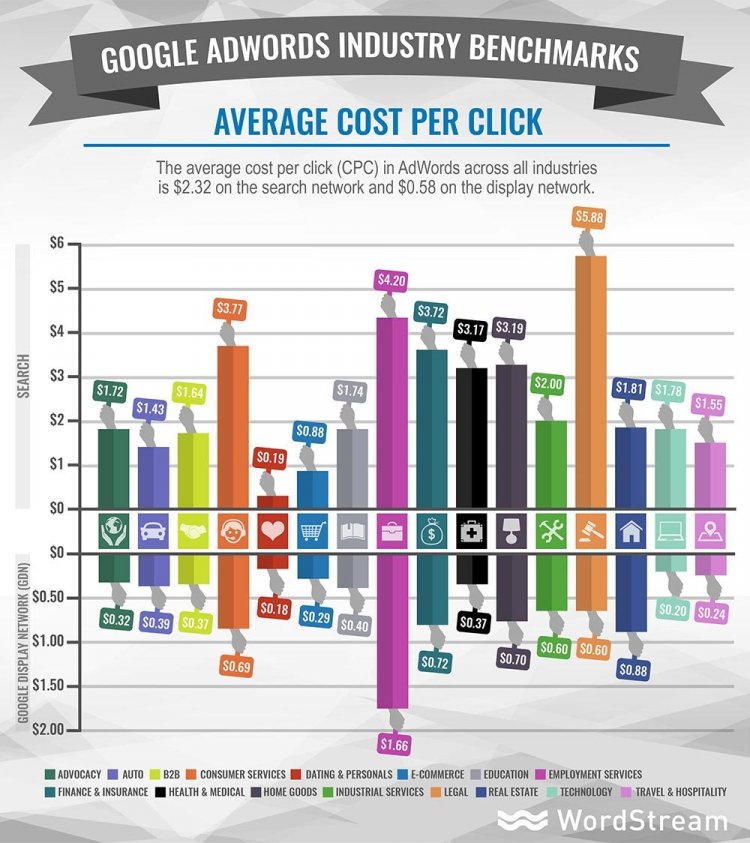
Running a real estate PPC campaign is a bit like gambling. You spend money, hit a button, and hope that the magic machine pays you back.
Of course, in PPC, you have far more control over the results of that button-hitting than you do at the local casino. Still, as when you visit a casino with a spending limit of a few hundred dollars (or a few thousand for you high-rollers), you should never launch a PPC campaign without first knowing your budget and the results you expect to get (realistically) from that budget.
But how do you determine a reasonable cost-per-click and cost-per-conversion for your business in your specific market?
Well, you just play off the numbers.
And we have this awesome budget and ROI calculator to help you easily determine your minimum and maximum budget per conversion. If, for example, I expect $10,000 profit per deal, I close 1 in 25 leads, my cost-per-click is $5, and my website conversion rate is 5%, my budget would be between $2,500 and $3,250.
In other words, I could spend up to $3,250 and still have a very healthy ROI for my business (208%, to be exact). And once you know your budget, it’s simply a matter of staying within that budget to generate leads and close deals. I love the way that Brian Rockwell put it in a CarrotCast case study.
Step #4: Write Compelling Ad Copy

When you go searching for something in Google (whether it be how to fix a faucet or reviews of Avengers: Endgame) you quickly determine which results you’re going to click on and which ones you’re going to scroll past.
How do you determine that?
By skimming the title tag and meta description of each result.
If, for example, I was searching for “how can I sell my house fast”, these are my top three picks for what I would click on.

Why? Well, it all has to do with the title and the meta description of those results and how well I think those results will solve my problem. The same is true for your PPC ads. When someone searches for something in Google, they’re looking to solve a problem. And your ad copy (the words for the title tag and meta description) need to promise to solve that specific problem for them.
And the single most important thing you’ll write is the headline for your ad. If this doesn’t get people to click, nothing will.
So spend a little extra time on this, run it by some friends if you have to, and make sure it’s primed to get your target market clicking.
Remember, depending on what PPC marketing method you choose, AdWords, Facebook, or Bing, you’ll be limited to either the number of characters you can use within the ad or the amount of text you can use within a FB ad. Be sure to use this ad “real estate” wisely.
Learn More: Real Estate Conversion Copywriting: How To Sell The “Click” With Your Meta Description And SEO Title
Step #5: Create a High-Converting Landing Page
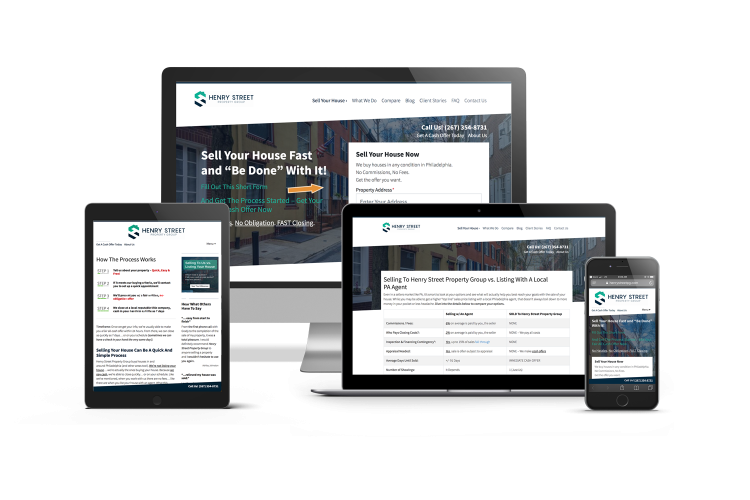
The final thing you need to do before you launch your real estate PPC campaign to give it the best chance of success is building a high-converting landing page. In the field of online marketing, the landing page is the place where people will go once they click on your ad.
The landing page needs to display content that reinforces your message contained in the ad. If your ads states you’ll give them a call in one hour, make sure your page also says one hour, not 24 hours.
The lead form on your landing pages must also reinforce the search as well as trigger the searcher to take action. “Contact Us” or “Get My Cash Offer” are a couple of examples.
Trevor explains landing pages and the importance of having an effective lead from here… Key Ingredients For Crazy High Converting Real Estate Lead Forms
If your real estate landing page isn’t optimized for conversion, then it doesn’t much matter how remarkable your targeting, your ad copy, or your budget is, no one is going to convert.
At Carrot, we’ve tested our websites hundreds of times to ensure high conversion rates for each of our members. Which means when you send the right advertising traffic to a Carrot site, you’re going to get results. You can sign up over here to try us out for yourself (risk-free, with a 30-day money back guarantee)!
Conclusion
When you finally decide to click the big red button… we want you to get results — real, tangible, business-building results. We want you to double or triple your money, we want PPC to become a revenue-generating machine for your business, and we want you to no longer fear launching a campaign.
But the only way to make that happen is to prepare before you hit the big red button.
And by following the five pre-launch steps in this article, you’ll ensure that every campaign you launch gives you a healthy ROI, takes you one step closer to dominating your market, and drives real revenue for your business.
If you have any additional questions about launching your upcoming PPC campaign, throw em’ in the comments and we’ll help you out. :)
